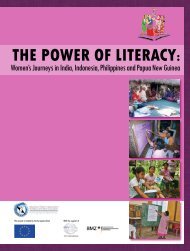Gender Discrimination in Education: The violation of rights of women ...
Gender Discrimination in Education: The violation of rights of women ...
Gender Discrimination in Education: The violation of rights of women ...
Create successful ePaper yourself
Turn your PDF publications into a flip-book with our unique Google optimized e-Paper software.
28. Where there was gender stereotyp<strong>in</strong>g <strong>of</strong> aptitudes for different subjects, girls were generally seen as better at ‘s<strong>of</strong>t’<br />
subjects like languages, history, art and music, and boys better at sports and more logical subjects like mathematics and<br />
comput<strong>in</strong>g. Overall, about half <strong>of</strong> respondents (both girls and boys) actually saw a difference <strong>in</strong> aptitude, align<strong>in</strong>g with these<br />
stereotypes. Some stereotypes favour<strong>in</strong>g boys seemed more prevalent among boys: at secondary level 56% <strong>of</strong> boys thought<br />
boys were better at sport, and 53% thought they were better at technology, compared to 40% and 46% <strong>of</strong> girls, respectively.<br />
<strong>The</strong>re were regional variations, however: <strong>in</strong> East Asia, for example, girls were seen as better at mathematics.<br />
GIRLS<br />
BOYS<br />
South Asia Girls<br />
South Asia Boys<br />
SE Asia Girls<br />
SE Asia Boys<br />
Lat<strong>in</strong> America Girls<br />
Lat<strong>in</strong> America Boys<br />
Language,<br />
History &<br />
Geography<br />
Maths, Physics,<br />
Chemistry &<br />
Biology<br />
Figure 2: <strong>Gender</strong> stereotyp<strong>in</strong>g <strong>of</strong> subject aptitude<br />
Art & Music Sports Computer tasks<br />
29. Students did not show any strong view on whether male or female teachers were more competent, but did express the<br />
view that men are more <strong>in</strong>telligent and <strong>women</strong> more car<strong>in</strong>g, especially <strong>in</strong> rural areas. <strong>The</strong>re was only a 5 percentage po<strong>in</strong>t<br />
difference <strong>in</strong> perceptions <strong>of</strong> the <strong>in</strong>telligence <strong>of</strong> male and female teachers <strong>in</strong> urban areas; but a 27 po<strong>in</strong>t difference <strong>in</strong> rural<br />
areas. In South Asia, there was a much more equal view <strong>of</strong> male and female <strong>in</strong>telligence, and female teachers were rated as<br />
more competent.<br />
30. Among teachers, female teachers were more than four times as likely as male teachers to state that they had<br />
experienced discrim<strong>in</strong>ation because <strong>of</strong> their gender. Overall, a huge one third <strong>of</strong> the female teachers surveyed said they had<br />
experienced such discrim<strong>in</strong>ation. <strong>The</strong>re was not a strong difference between rural and urban areas, or primary and secondary<br />
levels. <strong>The</strong> reports <strong>of</strong> discrim<strong>in</strong>ation were at the highest rate <strong>in</strong> Lat<strong>in</strong> America.<br />
Female teachers<br />
Female Teachers<br />
70%<br />
30%<br />
YES<br />
NO<br />
Figure 3: Teachers’ experience <strong>of</strong> gender discrim<strong>in</strong>ation<br />
Yes<br />
No<br />
Male teachers<br />
Male Teachers<br />
93%<br />
7%<br />
YES<br />
NO<br />
Yes<br />
No<br />
11<br />
<strong>Gender</strong> <strong>Discrim<strong>in</strong>ation</strong> <strong>in</strong> <strong>Education</strong>: <strong>The</strong> <strong>violation</strong> <strong>of</strong> <strong>rights</strong> <strong>of</strong> <strong>women</strong> and girls
















